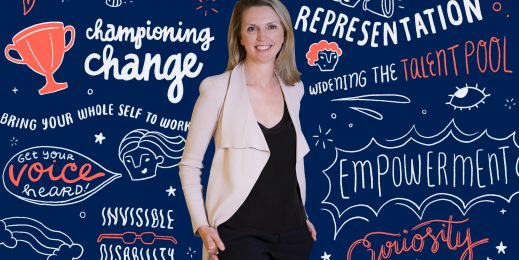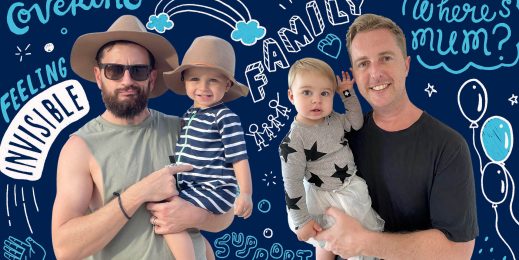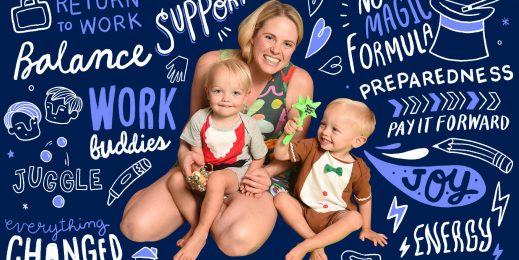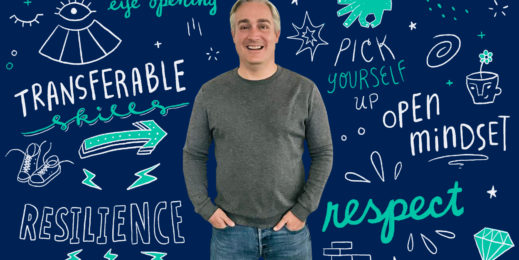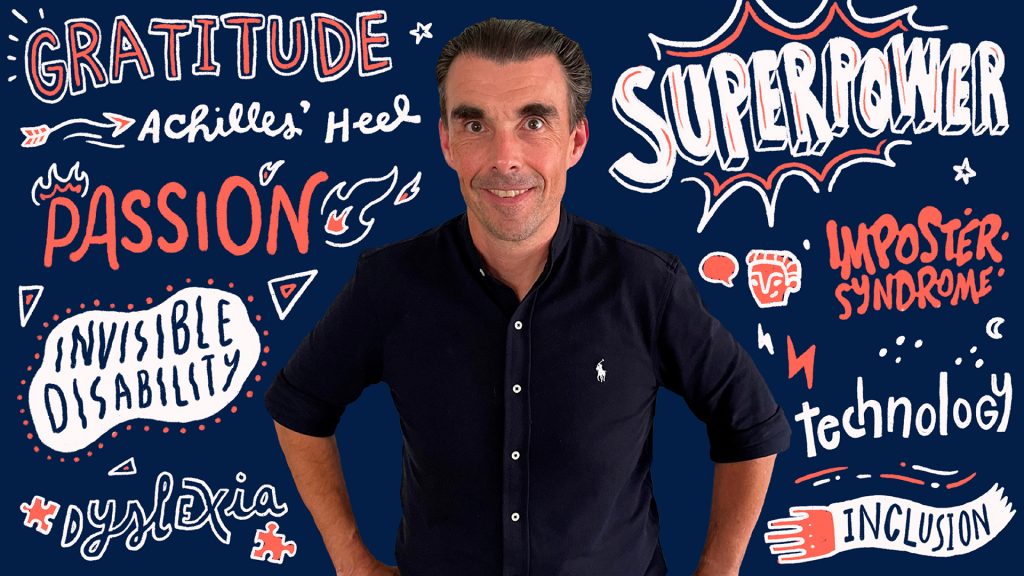
“I view my dyslexia as an advantage”: How Andrew turned his Achilles heel into his superpower
“Do we need to buy him a plumbing business?”
This was the question Andrew Lowson’s parents asked themselves as they watched their son struggle through school.
Andrew had a quick mind and a sharp intellect. He loved science, economics and history. But something about the English language wouldn’t click into place. Andrew would often lose his place while reading, forcing him to go over the same text again and again. And when looking back over something he’d written himself, he wouldn’t always see what was actually there – instead, he’d see what should be there.
Andrew’s brain, in other words, was wired differently. Like one in 10 Australians, he had dyslexia. And in the traditional boys’ school he attended in his hometown of Aberdeen, Scotland, where the focus was on Latin and Greek, the only option for Andrew was vocational study.
Andrew’s schoolmasters told him he wouldn’t amount to much, while his parents – and he himself – worried about what would become of him after graduation.
As it turned out, they needn’t have worried. Today, Andrew lives in Brisbane with his amazing wife and two beautiful daughters. He is a Modern Work Global Black Belt at Microsoft, working with disruptive technologies, creating new solutions for customers and loving what he does every day.
This is the story of how Andrew turned his Achilles heel into his superpower.
An education that didn’t fit
When Andrew was at school in the 1980s and 1990s, there wasn’t much awareness around dyslexia. It was assumed that every child learned the same way, and no real accommodations were available to help kids like Andrew, who took in information a little differently. In fact, Andrew remembers children like him being actively discouraged from aiming too high.
“One of my best friends at school had dyslexia as well,” he remembers. “And the headmaster actually told him, ‘Good job your father’s got a farm, because at least you’ll have somewhere to go when you finish school.’”
While that friend went on to Oxford University, where he graduated with First-Class Honours in Physics, neither he nor Andrew could have predicted how much better things would get at the time.
Right up until he turned 21, Andrew felt lost and unsure about the future. But that year, something snapped inside of him. “I decided to take life by the horns,” he says. “And I enrolled in college to do an advanced diploma in computer science.” As soon as he began his studies, Andrew realised he’d found his calling.
Unlike English, the language of computer programming came naturally to him, and even became a creative outlet.
“The way my brain was wired, I could actually see the code running in my head,” he explains. “And I’m still one of those strange people who gets excited about how many transactions can be processed per second.
I had found a place that I excelled, where I could turn my difference to my advantage.
Becoming a blue shirt
Andrew got a job writing custom timekeeping, billing and invoicing systems for a local offshore oil company shortly after graduating with his diploma. This led to another position managing the back-office development team for a major finance company in Edinburgh.
As his career developed, Andrew began to attend TechEd, Microsoft’s annual conference for developers and IT professionals, now known as Ignite.
“I always wanted to be one of the Microsoft people in the blue shirts up there on the stage at TechEd,” he remembers. “I was a total Microsoft fanboy. I used to drive people up the wall back in Edinburgh when I’d come back from TechEd saying, ‘We’ve got to get this Windows server’ and ‘We’ve got to do this Active Directory thing’.”
So, when an opportunity arose to join the team at Microsoft Australia as a SharePoint specialist back in 2005, Andrew jumped at the chance. Fortunately, he was already living in Australia. “I met an amazing Australian girl in 2002 and woke up the next day living in Australia and married with children,” he laughs.
“Joining Microsoft in 2005 was a bit of a dream, actually,” he says. “One of my proudest moments was the day I put on a blue shirt and presented at TechEd myself.”
Battling imposter syndrome
Andrew has been at Microsoft for 16 years now. And while his career has taken off in ways that he never expected, there are some things he wishes he could’ve done differently. Specifically, he feels there are times when his imposter syndrome has got in the way.
“I regret not enjoying it more,” he says. “I’ve had amazing times at Microsoft, and gone to places I never would have seen otherwise, like India and Japan. But I’ve never been able to completely relax. I’ve always assumed that at some point, the adventure would end. And to be honest, I still feel surprised every time I’m invited back for another year.”
Imposter syndrome is something Andrew has struggled with for a long time. He thinks it might be the scale of talent he works with at Microsoft, surrounded by engineers who have studied at MIT and Stanford.
“But I think my dyslexia feeds it as well,” he says. “Because I never did go to uni or do a formal degree.”
Andrew has tried approaching the problem in a variety of ways over the years, by doing research into imposter syndrome and practising mindfulness, for instance. Ultimately, though, he’s found a different method that works for him.
“I now take the same attitude towards anxiety and imposter syndrome that I take towards my dyslexia,” he explains. “I run towards it – I run towards what I’m stressed about and try to tackle it, as opposed to avoiding it or trying to quiet it.”
When he does feel anxious at work, Andrew also likes to step back and look at the bigger picture: Microsoft’s mission of empowering every person to achieve more – including people with learning and neurological differences.
“It’s easy to get caught up with internal stressors,” he says. “It helps me to adjust my focus, connect back to Microsoft’s bigger mission and understand why I’m here. Plus, fear comes from being worried you’re going to muck up.
The culture at Microsoft enables that mucking up not to be the end of the world. It’s the growth mindset we have – you just keep trying, learn from your mistakes and do better next time.
Empowering every employee to bring their authentic self to work
These days, Andrew views his dyslexia in an entirely different way than he did as a child.
“It’s not something I feel limits me anymore,” he says. “In fact, in the career I’ve chosen, I look upon it as an unfair advantage. It’s my superpower.”
At the same time, Andrew acknowledges that dyslexia and other neurological differences can make certain tasks more difficult for some employees.
“I’ve had occasions where I’m stressing over an email,” he says. “And something that should take two minutes can take two hours because I’m not sure which format to use, or whether that word conveys the right meaning, or whether I’ve missed anything. It can be a big stress item for me until I get to know the person I’m communicating with.”
If there’s one piece of advice Andrew would give to those who want to better support colleagues with dyslexia, it would be to let things go.
“I would say it’s a good idea to think twice before you correct someone,” he says. “Because in drawing attention to that tiny spelling mistake in an email, without knowing where the other person is coming from – that can stop them from bringing their authentic selves to work. And that’s not what we want.
“I’m a strong believer that every organisation has got to reflect the society it serves. Diversity is incredibly important. So my advice is to be as Microsoft is: open and understanding and enabling people to bring their authentic self, because I’ve certainly been able to do that.”





